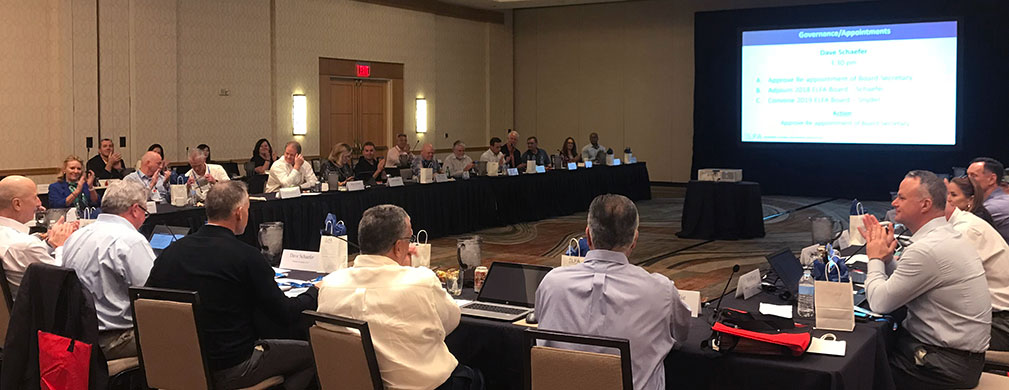In general, trade Association activities often involve competitors meeting and acting together to promote legitimate, common business interests. However, because they do involve joint meetings and other joint activities of competitors, some trade Association programs have been scrutinized by the Justice Department, by the Federal Trade Commission and by state agencies for possible anticompetitive behavior.
The antitrust laws may be enforced against an Association and its members and staff by federal and state officials, and also by private parties through treble damage suits. If members or staff of an Association participates in an Association activity that violates the antitrust laws, the Association, the members and the individuals involved may be sued in a civil or criminal proceeding. Penalties for antitrust violations may be severe. However, antitrust problems can be prevented if individuals who participate in Association programs are sensitive to the need to avoid conduct that might raise such problems for the Association, for their companies or for themselves. Some of the legal considerations relevant to Associations, and some areas to avoid in Association activities, are summarized below.
In general, the federal antitrust laws prohibit agreements, conspiracies or combinations that illegally restrain competition. The requirement of an agreement or combination often may be met easily in cases involving Associations, since they are situations where competitors meet or act together.
The antitrust laws do not require that, for a violation, there must be evidence that an explicit agreement to restrict competition was entered into. Instead, antitrust violations have been found where there has been no evidence of express oral or written agreements to engage in an anticompetitive activity. The existence of an agreement or conspiracy may be inferred from circumstantial evidence. For example, evidence that competitors discussed prices at an Association meeting and afterwards increased their prices by similar amounts may be sufficient to prove that an agreement existed, even though the competitors did not explicitly enter into a specific agreement at the meeting. In this respect, antitrust enforcement officials are suspicious of direct communications between competitors about prices or costs. They believe that communications about increased costs, for example, often lead to a tacit understanding to raise prices.
Some of the areas to be avoided in ELFA activities and meetings, whether as a part of the formal program or in informal discussions, are:
- Price fixing or other agreements which tend to control or establish prices.
- Arrangements to limit supply or to restrict the products or services that companies may provide.
- Agreements to divide or assign markets or territories in which companies may lease or otherwise do business.
- Plans to allocate customers to whom companies may lease, or with whom companies may otherwise do business.
- Boycotts or group refusals to deal with competitors, suppliers or customers.
- Arrangements that restrict truthful advertising or other methods of competing for business.

It may be helpful to provide some examples of specific arrangements that constitute prohibited anticompetitive practices.
An agreement among competitors to fix prices is illegal per se. Price-fixing can include an understanding or consensus on a specific price, price range, minimum or maximum price, profit margin, or on a pricing formula or system.
Actions that fall short of direct price fixing also may be found to violate the antitrust laws if they are used to encourage price uniformity or to limit price competition. For example, the exchange of information between competitors on the prices that they charge should usually be avoided, particularly when the information relates to current or future prices and includes details about the business of identifiable competitors. The same is true with respect to exchanges of information about the methods of determining prices. In connection with many Association price surveys and other data collection programs, various practical steps may be taken to structure the survey so as to prevent antitrust problems, and we are prepared to discuss these with you when appropriate. As another example, agreements among competitors to standardize products or the terms and conditions of sales, if they encourage price uniformity or affect competitively significant matters, also have been found to violate the antitrust laws under certain circumstances.
Specific examples of joint practices of competitors which may impact on price include:
- A trade Association of roofing contractors was prohibited from fixing the length and other terms of guarantees for the sale and installation of replacement roofs.
- Real estate boards' establishment of "recommended" commission schedules and sanctions against members who failed to adhere to them was illegal.
- A car dealers Association's circulation to its members of a uniform list price for cars was illegal because it affected actual retail prices, even though the list prices were only a starting point for bargaining and no sales were made at list prices.
- Exchanges of information concerning the most recent past price charged or quoted among sellers of shipping containers, even though on an irregular basis, constituted unlawful price-fixing.
- An engineering society's ban on competitive bidding was illegal.
- The antitrust enforcement agencies have indicated that an Association may not negotiate with buyers concerning the fees to be paid to Association members by the buyers.
In addition, collective action by competitors to refuse to deal with suppliers, customers or with other competitors can also be illegal. For example, it is unlawful for a group of Association members to agree that they will not purchase products from manufacturers because the manufacturers also sell those products to competitors of the Association members. Similarly, Association officials or committee members should not advise, or imply to, a supplier that the members of the Association will boycott the supplier if the supplier does not stop a specific business practice. Association members should not try to obtain more favorable terms from a supplier or a customer by agreeing that the members will refuse to deal with the supplier or customer unless more favorable terms are offered. Although an individual company may have the right to buy from or sell to whomever it wants, the antitrust laws can impose substantial civil and criminal penalties on companies and individuals that participate in group boycotts which are illegal.

Some examples of prohibited activities involving concerted refusals to deal are:
- It was illegal for a chain department store with significant buying power to induce appliance manufacturers to agree among themselves not to wholesale to an independent retailer who competed next door to one of the chain's outlets.
- The practice by a group of clothing designers of refusing to deal with retailers who sold pirated copies of original clothing designs was illegal, because it coerced retailers not to engage in a rival (i.e., pirating) and competitive method of marketing.
- The denial of communications connections by the New York Stock Exchange to a non-member was illegal, because it deprived the non-member of a valuable and competitively significant business advantage, even though he might have been able to conduct his business without the system.
- An Association of travel agents was enjoined under a consent decree from inviting or encouraging concerted action by travel agents to agree to deal with certain travel providers only on specified terms.The Association was also enjoined from directly or indirectly adopting or publishing any policy, standard, guideline, or statement made or ratified by an officer, director or other official of the Association that has the purpose or effect of encouraging such a concerted refusal to deal.
In sum, in order to help prevent the potential for antitrust problems and unnecessary litigation, we recommend that ELFA should not discuss, at ELFA meetings or in ELFA programs, matters that could involve price fixing; boycotts of suppliers, customers or competitors; division of markets; allocation of customers; restrictions on advertising or other competitive practices; or other potentially sensitive competitive subjects. At the same time, it is important to recognize that there is a broad spectrum of Association activities which, when properly conducted, do not involve significant potential for antitrust problems for the Association or for its members. ELFA has been successfully engaging in such legitimate activities for more than thirty years in order to promote the common business interests of its members, and ELFA obviously may continue to do so.